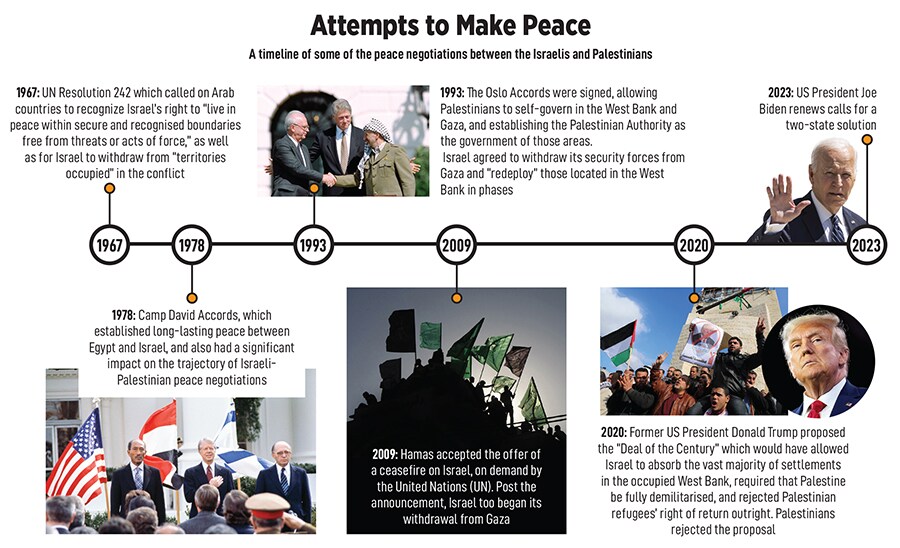Israel- Palestine: Two states, one long conflict
The Israel-Palestine war has been raging for decades. Although there have been many attempts at a resolution, like the ceasefire proposal in 2009, none have proven fruitful


In January 2009, Hamas (the Palestinian Islamist military group that controls the Gaza Strip) accepted the offer of a ceasefire on Israel, following an intervention by the United Nations (UN) Israel, too, began its withdrawal from Gaza. Fifteen years later—as the Israel-Palestine conflict refuses to be resolved—Hamas once again, in May 2024, accepted a proposal of ceasefire over Gaza and agreed on a hostage release deal with Israel. But, only a few days later, Israel launched strikes on the Palestinian city Rafah, leading to the end of ceasefire talks and the hostage deal. The situation remains fluid as of May 10.
The current situation follows months of intense fighting between Hamas and Israel, after the former launched an attack on the latter on October 7, 2023, killing more than 1,400 Israelis and taking more than 240 hostages. Israel retaliated with extensive airstrikes on the Gaza Strip and a ground invasion, resulting in more than 33,000 Palestinians losing their lives.
The Israel-Palestine conflict revolves around land that both claim authority and control over. Both Jews and Arab Muslims have been connected to it for millennia, but the current political troubles started in the early 20th century, resulting in numerous violent conflicts, which impacted other countries and killing several thousands.
In the 15 years between 2009 and now, much has happened in this long-standing dispute. In 2011, Palestine’s President Mahmoud Abbas applied for the country’s membership in the UN. Although the application failed—it didn’t get the required minimum support of nine of the Security Council’s 15 members—Palestine obtained the status of a non-member observer state in November 2012. In the same month, violence broke out between Israel and Gaza, concluding with an Egypt-brokered truce.
A new round of negotiations began in 2013, but was suspended by Israel in April 2014, following the announcement of a Palestinian Unity Government, which was a reconciliation between the Abbas-led Fatah movement and Hamas, which controlled Gaza.

In 2014, conflict was triggered again after Hamas abducted and murdered three Israeli teenagers, and, in retaliation, Israelis kidnapped and killed a Palestinian teenager. Hamas and other Palestinian groups launched rockets into southern Israel, which launched missile strikes and a ground invasion into Gaza. The 50-day conflict came to an end in August 2014. In June 2015, Palestine’s Unity Government was dissolved after Abbas said it was unable to operate in the Gaza Strip.
Pro-Palestinian students’ protests have surged at institutions such as the New York University, Columbia, UCLA, and the University of Virginia. Students are demanding that these institutions, many with massive endowments, financially divest from Israel. This means severing ties with Israeli companies or those that do business with Israel. There are also demands to end academic relationships with Israeli institutions. Around 2,000 demonstrators have been arrested. Universities in France, Germany, Canada, Australia, and Mexico are also witnessing protests, some in support of Palestine, others Israel.
The political solution to the conflict, supported by the international community and previously endorsed by both Israel and the Palestinian Authority, is the ‘two-state solution’. This entails establishing Palestine as an independent state in Gaza and most of the West Bank, with the rest of the land going to Israel. While the plan is clear in theory, significant divisions persist between the two sides regarding its implementation. Also, influential factions on both sides strongly oppose it. Alternatively, there is the ‘one-state solution’, under which the entire land is unified as either one large Israel, one large Palestine, or a shared state under a new name.
According to Harsh V Pant, professor of International Relations, King’s India Institute, King’s College London, since the Israel-Palestine conflict is “embedded in the wider ideological, religious and political dynamic of the region, it’s not very easy to resolve." He believes the conflict is not just wreaking havoc among the two groups, but has significant implications in neighbouring countries, India, and the world at large. “India’s relationships with many stakeholders in Israel, Gulf States, and even Iran are significant. If the conflict escalates, it is likely to start impacting India’s economy in ways that will be detrimental to India’s growth story."
First Published: May 31, 2024, 13:07
Subscribe Now